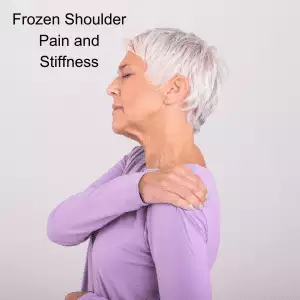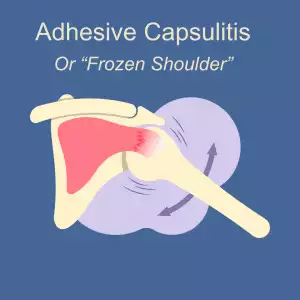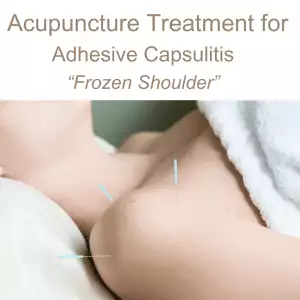By Qineng Tan, L.Ac., Ph.D. and Xiaomei Cai, L.Ac., Ph.D.

Can’t lift arm up? Front shoulder pain? Shoulders hurt when sleeping? Shoulder pain that doesn’t go away can be due to “frozen shoulder” and adhesive capsulitis. Acupuncture and TCM offer treatment for adhesive capsulitis frozen shoulder.
What Is Frozen Shoulder? Understanding Shoulder Pain and Adhesive Capsulitis
Frozen shoulder, medically known as adhesive capsulitis, is a painful condition that limits the range of motion in the shoulder. Over time, the shoulder joint can become stiff and difficult to move, leading to a significant loss of mobility.
Frozen shoulder typically progresses through three stages:
- Freezing – pain becomes gradually more intense, and range of motion decreases, sometimes until the arm is immobile – can last 6 weeks up to 9 months
- Frozen – pain may lessen, but the shoulder joint is still stiff and very difficult to move – can last 4-6 months
- Thawing – movement and strength is slowly regained – typically lasts anywhere between 6 months to 2 years
While frozen shoulder may be considered resolved when the pain has improved and basic functionality returns, many people continue to feel some stiffness and pain for many years.
What Causes Frozen Shoulder?
The shoulder is a ball-and-socket joint made up of three bones:
- The humerus (upper arm bone)
- The scapula (shoulder blade)
- The clavicle (collarbone)
The ball of the upper arm bone fits into a shallow socket in the shoulder blade, and this joint is surrounded by a thick capsule of connective tissue called the shoulder capsule. To help the shoulder move smoothly, synovial fluid lubricates the joint.
In cases of frozen shoulder, this capsule thickens and becomes stiff, with the development of adhesions or scar tissue, reducing the fluid in the joint. This usually leads to significant pain and often severely limited movement in the shoulder.
What Are the Risk Factors for Adhesive Capsulitis of the Shoulder?

Frozen shoulder primarily affects adults, especially those between 40 and 60 years old, and it occurs more often in women than men. It is particularly common in women experiencing perimenopause and menopause, likely due to hormonal changes that can contribute to joint and connective tissue issues.
Certain medical conditions increase the likelihood of developing frozen shoulder. For example,
people with diabetes are at a higher risk for frozen shoulder, and they often experience more severe stiffness and longer recovery times.
Both hypothyroidism and hyperthyroidism are associated with an increased risk of frozen shoulder.
Immobilization of the shoulder following surgery or injury can also trigger the onset of frozen shoulder, especially if movement is restricted for long periods.
Many people wake up with a sore shoulder from sleeping in a way that restricts movement. Shoulder discomfort or front shoulder pain can happen due to sleeping positions that put pressure on the sensitive shoulder joint.
Frozen shoulder can also cause discomfort on one side, leading to reports of sore right shoulder or ache in left shoulder depending on which shoulder is affected.
Treatment for Frozen Shoulder/Adhesive Capsulitis
A doctor will typically diagnose frozen shoulder after an examination to determine passive range of motion and active range of motion in your shoulder. They may choose to order X-rays to rule out other problems.
In most cases, using hot and cold therapy with compresses and icing may be recommended, as well as pain medications/anti-inflammatories like Ibuprofen. If pain continues to be severe, a physician may offer steroid injections (corticosteroids).
Patients may be referred for physical therapy or massage to help with stretching and improving range of motion.
If pain and immobility persists past a year, surgery may be recommended. A “capsular release” procedure involves making small incisions in the tissues of the shoulder capsule. Manipulation and massage, while a person is anesthetized, can also help loosen up the tissues to allow for more mobility.
Acupuncture treatment can help relieve pain and improve mobility for frozen shoulder treatment without negative side effects that can come from the ongoing use of OTC pain medication and cortisone shots/corticosteroids, so it may be considered as an adjunct or alternative treatment for adhesive capsulitis.
Can Acupuncture Help Frozen Shoulder?
The TCM Chinese term for “frozen shoulder” translates into English as “shoulder at the age of 50 years.” Clearly, people in their middle age have been experiencing this pain and limitation in the shoulder joint for centuries. TCM has developed ways of helping to improve this condition.

According to TCM theory, frozen shoulder may fall under the category of “Bi Syndromes.” “Bi” refers to an obstruction of some sort, and Bi Syndromes typically cause pain and stiffness in a part of the body, due to a blockage of the flow of Qi (life force energy).
In TCM, “wind,” “damp,” and “cold” are considered pathogenic forces that can settle in an area of the body and cause blood and Qi to stagnate. This can cause stiffness, lack of movements, tenderness, swelling, and pain in that area. Most types of arthritis, for example, are considered Bi Syndromes.
Conventional medicine tends to treat each person presenting with a condition with the same types of treatments and waits to see if they work. In TCM, there is an understanding that different people can have the same symptoms, and yet have different underlying problems that are causing pain and other symptoms.
Different people may experience pain and stiffness due to different factors. One person may have a stiff, sore shoulder due to an invasion of cold or damp, while another person may show signs of heat or wind. In other words, the very specific presentation of symptoms can help the acupuncture practitioner to determine the underlying causes of the condition and treat them accordingly, with acupuncture and herbal remedies.
The stimulation of specific acupoints can help bring more blood flow to the shoulder joint, so that more nourishment can help reduce inflammation. Electroacupuncture, in particular, can help activate the release of endorphins that reduce pain.
A review of 13 controlled studies of the usage of acupuncture treatment for frozen shoulder determined that it is a good modality for both reducing pain and restoring proper shoulder function.
A randomized, single blind controlled trial looked at 35 patients with frozen shoulder symptoms. Some of the patients were assigned to a group that would engage in physical therapy sessions twice per week, practice exercises at home daily, and not use any pain medications, except in “emergency” situations.
The other group also engaged in physical therapy and exercise, plus they also were given acupuncture treatment twice per week, with functional movement exercises being performed during the acupuncture session.
After six weeks of treatment, patients who had only had PT showed an average 39.8% improvement, while the PT plus acupuncture patients showed an average 76.4% improvement.
One recorded case study detailed that, after 24 acupuncture treatments, a patient regained full range of motion in their shoulder and reported that pain was entirely gone.
Acupuncture for Frozen Shoulder Near Me in West L.A. and Santa Monica
At Art of Wellness Acupuncture in West Los Angeles, we have over 35 years of experience helping patients find relief from joint pain of all kinds. Dr. Tan is a specialist in treating orthopedic pain. We successfully treat joint pain conditions like frozen shoulder, osteoarthritis of the knee, tennis elbow, bone spurs, bursitis/hip pain, gout, and more. If you are suffering from a lack of mobility and pain in shoulder, please consider visiting our acupuncture office in Los Angeles for a consultation.
*This article is for education from the perspective of Traditional Chinese Medicine only. The education provided by this article is not approved by FDA to diagnose, prevent, treat and cure human diseases. It should not stop you from consulting with your physician for your medical conditions. Traditional Chinese Medicine is based on Qi, which is an invisible force that usually cannot be observed by modern science. Because science focuses on testing ideas about the natural world with evidence obtained through observation, these aspects of acupuncture can’t be studied by science. Therefore acupuncture and Chinese herbs are often not supported by double-blind, randomized trials, and they are considered alternative medicine therapies in the United States.
